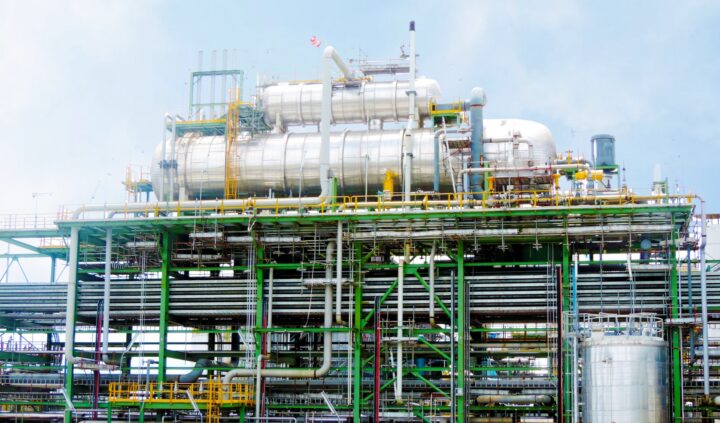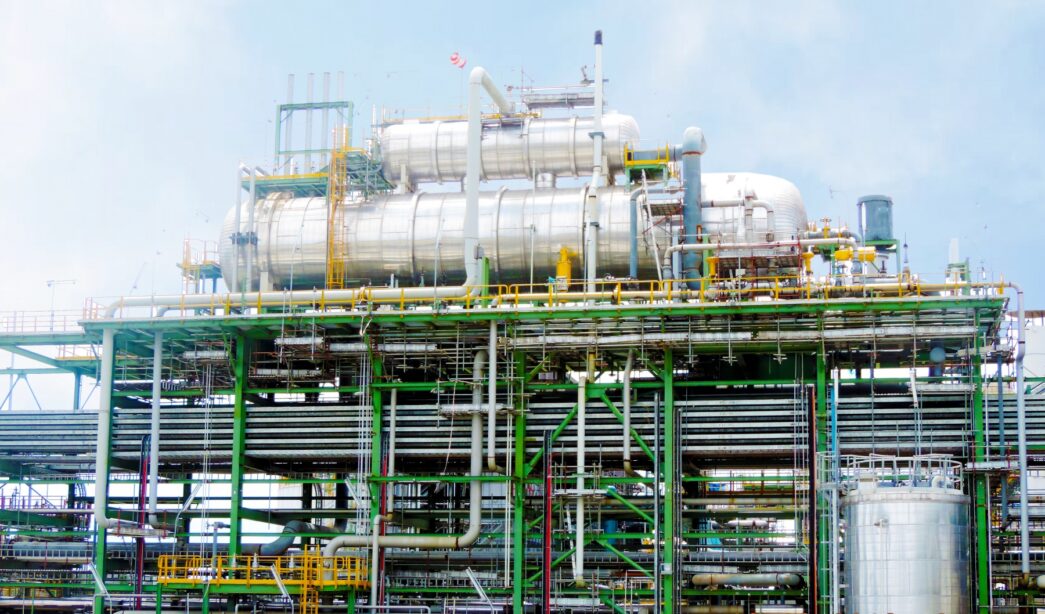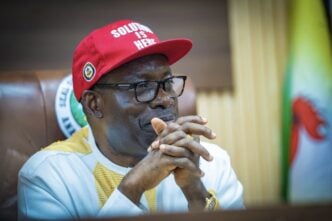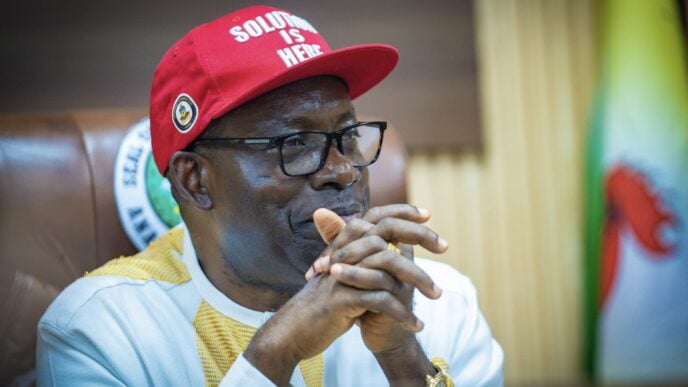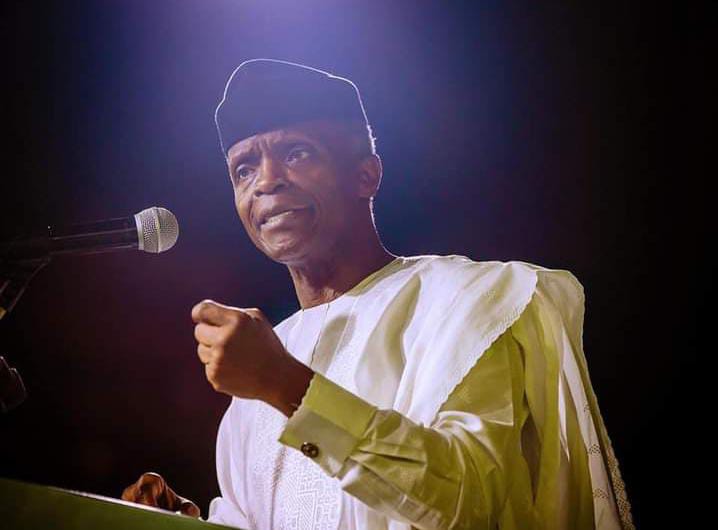At this season of Nigeria’s 65th independence celebrations, yours sincerely considered it sad to note that the refining of the country’s most precious endowment is creating a recurring but disruptive albatross to the growth and general economic wellbeing of the nation.
Days past, the purportedly resolved tango between Dangote Refinery and Nigeria Union of Petroleum and Natural Gas Workers/ Petroleum and Natural Gas Senior Staff Association of Nigeria – NUPENG/PENGASSAN by the federal government remains another sour spot in efforts to revive a corruption-induced near comatose petroleum industry.
Before forging ahead, yours sincerely considers making a necessary confession as a prelude to today’s piece: And this has to do with my not particularly being a big fan of Aliko Dangote because of the business tradition that capitalists like Aliko are ruthless money men that are always ready to decimate any seen or unseen obstacles on the paths to achieving their profiteering goals. Unimaginable wealth creation antics of investors like Alikos of this world could sometimes be system compromising. They, in pursuit of wealth, usually don’t accept ‘NO’ for an answer.
Notwithstanding, the foregoing would not detract from applauding the significance of investments of the Alikos of this country in creating gainful employment for millions of Nigerians – contributing to national development and growth in the process. Sadly, other immensely rich Nigerians keep their wealth in the banks, making fat interest earnings far from the prying eyes of the public.
Advertisement
Consequent upon this, there’s the need for a dispassionate scrutiny of the industrial tango between Aliko’s Dangote Refinery and NUPENG/PENGASSAN so that in a civil polity, a clear boundary, moving forward, can be set between a private growing concerns, labour union activism and national security cum interests.
What’s at issue is NUPENG-PENGASSAN’s nosy intrusion, under the guise of protecting members’ interests, in the way Aliko chooses to manage his $20 billion refinery business. It is quite possible that the accusation of unfair treatment of Nigerian workers at the expense of expatriate employees, particularly Indians, who are reportedly being paid fat wages, might have added to the industrial animosity against the refinery. The overzealous reaction of the trade union stands condemned. Let it sink at the moment that, until when Rabiu’s BUA petroleum refinery is fully completed and functional, and even after, every necessary governmental support must be accorded Aliko so as not to send a wrong signal to the world that this country can forsake her critical investors at their moments of needs.
Kudos to the government’s team led by Mr. Wale Edun, the Honourable Minister for Finance and Coordinating Minister for the Economy, for reaching a seeming denouement on the impasse before it spiralled out of control. It is good to know that the sacked 800 staff of the refinery will be reabsorbed and redeployed to other investment projects of the Dangote Group.
Advertisement
But the key issue of what happens is that a trade union body tries to hold a huge investment such as the Dangote Refinery by the jugular while hiding under freedom of association guaranteed by the grundnorm and even the ILO Convention. It’s Aliko Dangote’s company today, but who knows whose company’s turn will be affected tomorrow.
PENGASSAN leadership acted, while its encounter with the refinery lasted, as if another name for unionism is lawlessly putting a nation under siege. Its leadership acted as if they were motivated by other interests other than that of the affected workers of the refinery.
It is evident that a clear line exists, and must continue to exist, between labour rights and national interests. However, going forward, the Federal Ministry of Labour must step up its advocacy efforts in this area. Such action is crucial not only to raise public awareness but also to prevent the kind of unnecessary panic caused by oil workers’ unions, who recently threatened a nationwide shutdown of petroleum and gas supply during their dispute with Dangote Refinery, despite lacking the authority to carry out such a threat.
Undoubtedly, workers have the right to organize, protest and strike as stated in the combined reading of section 40 of the 1999 Constitution which guarantees the right to freedom of association, and the International Labour Organization (ILO) Conventions 87 and 98 of which Nigeria is a signatory, allowing voluntary workers will to join trade unions. But like every other inalienable rights, this right to associate with a trade union to protect employees’ rights and possibly embark on a strike action where necessary as a legitimate tool of collective bargaining, is not absolute.
Advertisement
There are constitutional proviso, including restrictions to protect public safety, order, health, morality, and national security. It should also be noted that the Trade Disputes Act lays down strict condition precedent that must be met before a strike can be lawfully embarked upon by a labour union. These include conciliation, arbitration, and reference to the National Industrial Court. It is doubtful that NUPENG-PENGASSAN ever fully explored these areas before putting the refinery, albeit the nation on avoidable siege with their strike.
The trade unions mischievously pretended to forget that petroleum and gas supply under the law are classified as essential services which they lacked the powers to disrupt because doing such is not only criminal but also inimical to national survival and an act of economic sabotage that can cripple the nation’s vital activities.
Even the International Labour Organization, despite guaranteeing the right to strike, equally accepts restrictions where services are “essential to the life, personal safety, or health of the population.” This fully describes directly or incidentally what Dangote’s refinery does. The law governing essential services to protect national security is very handy for the government to deploy next time this happens.
PENGASSAN should be schooled on the reality that the country is no longer under military rule when the unions were effectively deployed to combat military dictatorship. At this point in time, the country is under a constitutional democracy premised on Professor A.V. Dicey’s well espoused doctrine of the rule of law. Thus, the rights and limitations of employers and employees exist and, in this particular instance, must be obeyed by the parties involved to halt any ugly tide of human and economic disruptions.
Advertisement
Can anyone deny the staring fact that we’re in this mess because in sixty-five years of being an independent entity, we as a nation have four government-owned refineries. But as of today, none of the refineries is working at anything near satisfactory? Yet, every budgetary season, we set aside money for turnaround maintenance, usually in hard currency, but nothing positive ever comes out of this waste of public funds.
Recently, the immediate past Managing Director/CEO of NNPCL, Mr. Mele Kyari, and some of his top executives were reportedly invited for questioning by the Economic and Financial Crimes Commission (EFCC) over misappropriation of money allocated for the Port Harcourt refinery. Nothing has come out of that invitation. Another sad thing is that some Nigerians employed to work in these refineries who are members of these trade unions collect salaries and allowances and were sent on training programs abroad for doing nothing.
Advertisement
Some of them have actually retired and paid gratuity and pensions for decades of unproductivity. This sorry state is being replicated in Ajaokuta Steel Rolling Mills and others where trillions of the nation’s hard earned money are daily wasted by unionised staff idling away. The oil cabal and allies masquerading as trade unions holding our petroleum industry hostage should look elsewhere, forthwith.
If a globally renowned capitalist, riding on our collective ineptitude and tomfoolery and having enjoyed scandalously discretionary forex rate approvals from the Federal Government, was able to successfully build one functional refinery with 650,000 bpd capacity, we should do everything to support him to make it work in our collective interests.
Advertisement
Yours sincerely believe our trade unions should, as a matter of necessity, be encouraged to discharge their duty of protecting worker’s interests; but this should preferably be done with dignifying poise devoid of ulterior motives. This is what can make Hubert Nathaniel Critchlow, the father of Trade Union Movement from Guyana, turn in his grave in admiration for what the movement is doing in this country.
Nigerians will be better off to see this privately-owned Dangote refinery succeed so as to insulate the nation from avoidable waste of scarce forex expended on sometimes phantom, but most times, avoidably needless fuel importation with catastrophic consequences on the wellbeing of the economy. My humble submission!
Advertisement
Sanusi, former MD/CEO of Lagos State Signage & Advertisement Agency, is currently the managing partner at AMS Reliable Solicitors.
Views expressed by contributors are strictly personal and not of TheCable.

